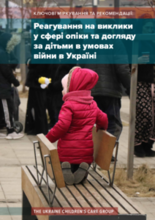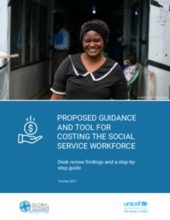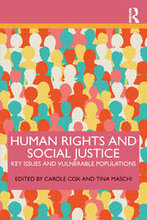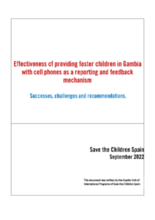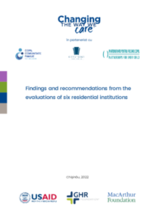Displaying 901 - 910 of 10391
МЕТОЮ ЦЬОГО ДОКУМЕНТУ З РЕКОМЕНДАЦІЯМИ є надати певну рамку для підтримки фахівців-практиків і посадовців, відповідальних за вироблення політики у сфері опіки та піклування над дітьми, як в Україні, так і в країнах, які приймають біженців, у рамках заходів реагування, що стосуються опіки та догляду за дітьми в контексті України у відповідності до міжнародних стандартів і належної практики у сфері опіки та піклування та забезпечення альтернативних форм догляду.
The purpose of this guidance is to advise policy makers and planners on how to apply a set of variables to their specific context to enable them to calculate the costs of human resources required to meet a target minimum ratio of social service workers per population, in the country in question. The guidance first discusses the essential steps that need to be taken to prepare for a costing exercise, and then the specific steps to take in a costing exercise for the workforce, which are outlined in the costing tool itself (to be released at a later date).
This is the monthly update of the Eastern and Southern Africa Regional Learning Platform published in October 2022.
This guide is intended to inform policy makers and workforce managers in ministries of social welfare, finance and planning, and, where applicable, provincial or district authorities and other relevant national bodies responsible for the recruitment, deployment, funding or regulation of the social service workforce. The guide can also be used by a national level leadership group tasked with defining an adequate level of resourcing for social services, and, on this basis, a minimum ratio of workforce to population, alongside other steps to strengthen the social service workforce.
In this chapter of the book 'Human Rights and Social Justice', the authors focus their attention on issues and challenges facing rural youth who have exited care, with special consideration of First Nation or Indigenous youth in Canada, and offer a multidimensional framework that can support anti-colonial and anti-oppressive models of practice.
Save the Children a développé ce programme d'apprentissage afin d'évaluer l'utilisation des téléphones portables comme mécanismes d'information et de rétroaction pour les enfants placés en Gambie et de déterminer s'il est efficace et sécurisé.
Save the Children has developed this learning agenda in order to assess the use of cell phones as information and feedback mechanisms for foster children in Gambia and to determine whether it is effective and secure.
În 2021-2022, CTWWC în parteneriat cu trei organizații ale societății civile: Keystone Moldova, Copil, Comunitate, Familie (CCF Moldova) și Asociația Parteneriate pentru Fiecare Copil (P4EC), a realizat o serie de cercetări la nivel național, inclusiv evaluarea complexă a șase instituții rezidențiale (IR).
During 2021-2022, Changing the Way We Care in partnership with three civil society institutions: Keystone Moldova, Child, Community and Family (CCF Moldova) and Partnerships for Every Child (P4EC), conducted a series of assessments on the national level, including a complex evaluation of six residential institutions (RI).
This thematic report is a merged and synthesised version of two full study reports, each focusing on education and healthcare in Malaysia. More details regarding the background, methodology, findings and recommendations of this project are found in the respective study reports.

